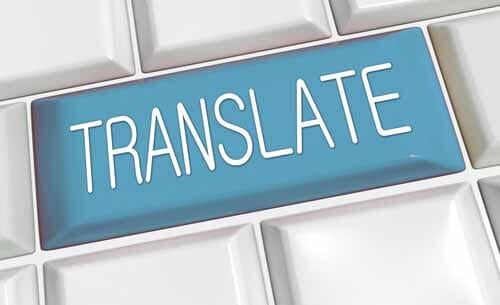Listen to Audio Version:
Interpreting services are usually something the average person doesn’t really think about. We know that interpreters help people overcome language barriers. But unless we use interpreting services for ourselves or for our businesses, we don’t typically know a lot about how interpretation works.
As a language services provider, we’ve heard a lot of misunderstandings about interpreting services. We’d like to clear things up for you so if you ever need interpreting services, you’ll be able to avoid making some big mistakes.
Let’s discuss eight common misconceptions about interpreting services and what you need to know about them.
Misconception #1: Any Bilingual Person Can Interpret
This is probably the most common myth that we hear: any bilingual person can interpret for you. While a bilingual person does speak two languages and might be able to help in a casual conversation, it does not always mean that this person knows how to interpret for people in every situation.
If you are in a formal setting, like a medical center, you run the risk of your bilingual friend or family member not knowing how to interpret medical terminology or being unwilling to share bad news.
We heard a story about a hospital that arranged for a bilingual employee to do a quick interpretation for a patient. However, this employee did not know the terminology for a routine medical test and ended up telling the patient they needed surgery.
You can imagine the alarm the patient felt, going in for a routine procedure and being told she was going to have surgery. Thankfully, the hospital staff then ordered a trained interpreter, who cleared up the confusion.
This is just one example of the challenges your bilingual friend, family member, or employee could face when trying to help. In formal situations like these, you need a trained interpreter to make sure your message is conveyed clearly and accurately.
Professional interpreters are trained in ethics, industry terminology, and how to respond to different scenarios that may arise. Training includes their responsibility to convey everything that is said, on both sides of the conversation, as well as the need for confidentiality.
Misconception #2: The Speaker Should Face the Interpreter
A lot of people believe that when working with an interpreter, you should look at the interpreter when you speak. This is not true. The speaking parties should face each other, not the interpreter. This way they can speak naturally, and the interpreter can be a facilitator in the background.
It might seem awkward if the person is speaking in the first person. But the interpreter will speak in the first person as well, interpreting exactly what the first party says, in the target language.
For example, at a doctor’s appointment, a patient would say, “I am experiencing these symptoms….” The interpreter would repeat, “I am experiencing these symptoms….” Then the interpreter repeats the doctor’s response. This allows the parties speaking to have the most natural conversation possible.
Misconception #3: Any Interpreter Will Do
While interpreters can be trained in multiple fields and multiple settings, they do have their own skill sets. That’s why you should ask your language services agency for an interpreter who specializes in your field. That skill set will help the interpreter relay the message accurately and completely.
We recently had the privilege of providing interpretation services to a biotech company. They asked for someone with experience in that industry. One of our interpreters was highly qualified in this field and available to help.
Our office manager was able to sit in on the first meeting with this company, and he admitted that he struggled to understand the terminology they were using – and it was in English. Can you imagine struggling to comprehend the terminology and having to interpret it into a second language? This is why having an interpreter who has experience and knowledge about your specific field is critical.
Misconception #4: Interpreters Do Not Need to Prepare
While it’s the nature of the job for interpreters to interpret spontaneously, we shouldn’t assume that they don’t need or want time to prepare for an assignment. A lot of trained and experienced interpreters prefer to review the material or subject matter before the meeting.
If you need interpretation services for a business presentation, for example, you can send your presentation to the language services provider in advance. The agency will send the presentation or notes to the interpreter, so they can prepare for the specific words, phrases, or concepts used. This helps the interpreter to accurately convey the meaning of the presentation simultaneously.

Misconception #5: You Can Start as Soon as Everyone Arrives
Many people think that the interpreter can join the meeting and start interpreting immediately. While this is possible, it does not set you up for success.
Instead, plan some time at the beginning for introductions and to establish guidelines as to how the meeting will go. With clear expectations in place, the conversation will move smoothly, and communication will flow.
Misconception #6: Interpreter Skills Are Static
Professional interpreters are skilled and usually experienced. But this does not mean that they would not benefit from feedback or continuing education. The most successful interpreters in the industry are the ones that continue to develop their skills.
Interpreters handle unexpected situations all the time. The more they can develop their skills and learn about the industry, the easier it will be to facilitate the conversation.
Plus, languages are fluid – words change, local slang changes, cultural references change. When interpreters stay on top of changes in the industry, language, and culture, they are better able to connect with the parties involved.
Don’t underestimate feedback! If you have feedback on your experience with an interpreter, whether positive or negative, please share it with the agency. Many of our most successful interpreters appreciate feedback to help them improve their performance.
Misconception #7: Interpreters Are Available Any Time
One of the benefits of going to a language services provider is that they have an established roster of interpreters. However, you cannot assume that this means interpreters are available at a moment’s notice.
While we would like to be able to meet your needs immediately, many of the most successful interpreters manage their schedules independently and are not always available at a moment’s notice.
You should let your language services provider know of your needs as far in advance as possible, so they can be sure to reserve the right interpreter for the specified time. Planning in advance helps them make sure you get the right qualified, skilled, and industry-specific interpreter for your meeting.
Misconception #8: Telephone or Video Interpreting are Substitutes for In-Person Interpretation
Telephone interpreting and video interpreting are convenient options for interpreting, but they are not always a substitute for in-person interpretation. Each method has its advantages and works well in specific situations, but they are not interchangeable.
Telephone interpreting is best for when you need to have a quick conversation with clients, customers, or employees who don’t speak your language or need to make a phone call to set up an appointment.
Video remote interpreting (VRI) is ideal for short appointments when meeting with an in-person interpreter isn’t feasible, but you still want a visual connection to the interpreter. It’s also a great option for working with an American Sign Language interpreter.
Video conference interpreting works well for virtual meetings and conferences. It enables you to have attendees from all over the world and provide them with live interpreters, so everyone understands the material presented and can participate in the conversation.
In-person interpretation works best for situations that involve sharing sensitive information, like a medical diagnosis or a school meeting, or for important business interactions or long meetings. If you need that face-to-face interaction, then you want an in-person interpreter.
Each of these interpretation services has its own place, and we are happy to answer questions about each option and help you decide which one is best for your needs. Learn more about Using Interpreting Services on our blog.
Rapport International specializes in multilingual communications, providing language translation and interpretation services that are accurate and culturally appropriate. We use the right voice and the correct terminology to avoid liability, customize services to your needs, and deliver on time and within your budget. With our 100% satisfaction guarantee, you can trust that it’s done right. Contact us today if you would like more information or to get a free quote.
Rapport International specializes in multilingual communications, providing language translation and interpretation services that are accurate and culturally appropriate. We use the right voice and the correct terminology to avoid liability, customize services to your needs, and deliver on time and within your budget. With our 100% satisfaction guarantee, you can trust that it’s done right. Contact us today if you would like more information or to get a free quote.
Popular Posts
Popular industry news, interviews, technologies, and resources.



















